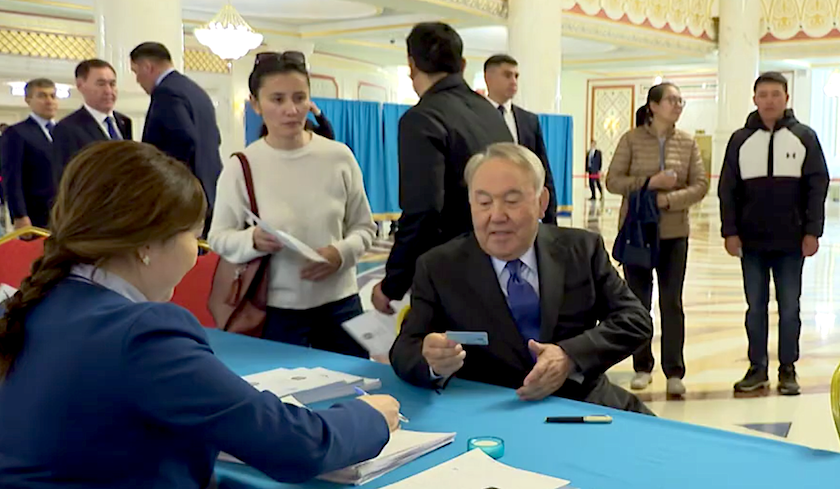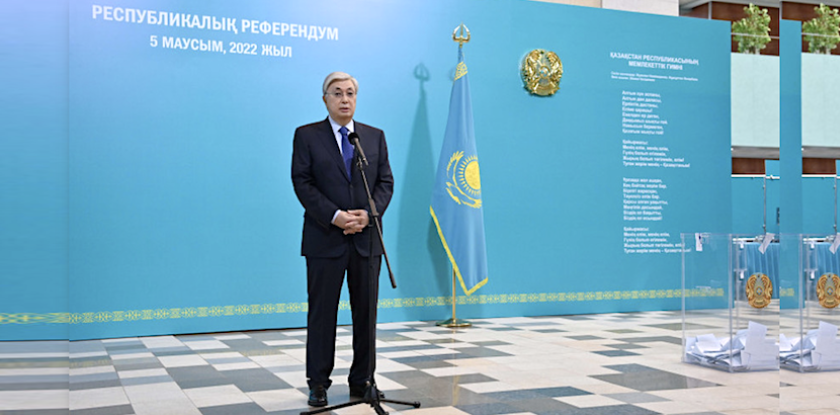The nationwide referendum on making the “Tokayev” amendments to the RK Constitution has taken place in Kazakhstan. According to the preliminary results of the Central Electoral Commission, 7986293 people have taken part in the voting which constitutes 68.06% of the citizens with the right to vote. Let’s see how the votes were divided.
In one of our earlier publications titled “Referendum Gives New Chance to Opposition”, we have written:
“If the number of the people casting their vote on June 5, 2022, will be closer to 60%, it will, in our opinion, signify the failure of Kassym-Jomart Tokayev and Akorda.”
“However, if, on June 5, 2022, the share of the actual voters will get closer to 80% of their listed number, this will undoubtedly signify the victory for the second President and his team.”
So, according to the proposed layout, it looks like, even though Kassym-Jomart Tokayev and Akorda did not lose at the June 5 referendum, they did not win, either. One may qualify the outcome as a tie (albeit it is unclear with whom).
Of course, the official propaganda will probably attempt to sell the referendum results as Tokayev’s victory while trying to convince the Kazakhs that their majority have expressed their belief in Nursultan Nazarbayev’s successor on the throne.
To out regret, the democratic (and other) opposition did not show much activity on the day of the voting and before. Yes, some individual protests did take place but there was no put-together campaign. And this speaks volumes. For instance, that the outburst of the protest sentiments of January 2022 has lost its momentum.
Nonetheless, some figures from the aforementioned press-release do encourage optimism.
First of all, there is this fact.
“The number of the citizens that have cast the positive vote at the referendum constitutes 77.18% or 6 million 163 thousand and 863 people of the total number of those participating in the referendum in all the country’s regions”.
In other words, 22.82% or every fifth+ voter have voted against the “Tokayev” amendments. For Kazakhstan, such percentage is abnormally high.
Secondly, those who voted against Tokayev and Akorda’s political initiative are far from being united. This clearly follow from the fact that -
“The number of the citizens who have voted against the constitutional amendment constitutes 18.66% or 1 million 490 thousand and 475 people participating in the voting.
The number of the ballots with the both options checked (in other words, admissible but not included in the vote count) constitutes 1.58% or 125 thousand and 859 ballots.
The number of incorrect ballots from which the voters’ expression of will cannot be determined and that are deemed inadmissible constitutes 2.58% or 206 thousand 096 ballots”.
We at KZ.expert believe that the most proactive nay-sayers were those who, instead of the official ballots, had put their own “brainchild” into the ballot boxes (in other words, what the CEC deems “the incorrect ballots”). Let’s call them the first group of the voters.
Why do we think they were the most proactive? If only because they took the trouble to invest their time and effort as well as to show a certain political adamance.
The voters who chose the other way to express their disagreement with the “Tokayev” amendments were not as adamant – they did not invest their time and effort in printing their own ballots but simply checked both boxes on the official form (let’s call them the second group of the voters).
Anyway, if we subtract the number of the voters who checked both boxes by mistake, the number of those voted against Kassym-Jomart Tokayev and Akorda would be still unusually high – a little less than 331955 people.
Regarding the other two (much larger) groups of the voters, assessing the reasons of their political activity (or passivity) seems to be a much harder task.
Let us begin with the 1490475 people who have voted against the amendments (the third group).
Obviously, these voters are united only by the box on the voting ballot that have checked. Their political views, however, may be on the opposite ends of the spectrum since this group includes both the supporters of Nursultan Nazarbayev (we must allow for the possibility that such people exist) and the political and personal opponents of Kassym-Jomart Tokayev and his team. As well as those emotionally reacting to the fact that they were forced to come to the voting stations and donate their time.

Nursultan Nazarbayev is casting his vote at the referendum of June 5, 2022. A video-freeze.
This is what makes us think that the third group of the voters contains a lesser share of the second President’s political opponents (in other words, those ready to take part in the real political and social protests) than the first two. But we are not to guess how much lesser it is since such an undertaking will invariably turn into a coffee reading.
Finally, there is the fourth group of the voters – those who have ignored the referendum. This group turns out to be much larger than it used to be under Nazarbayev’s “reign”, 3748349 people.
Analyzing the logic of their behavior and, therefore, their views is even harder than assessing the behavior of the third group of the nay-sayers. Simply because the last group includes everyone – be it the politically active Kazakhs who chose not to vote as a matter of principle, or the lazy folks who simply didn’t want to bother, or those engaged in some personal matter, etc.
You will recall that, on the eve of the referendum, we have forecasted the following (quoting from “Referendum Gives New Chance to Opposition”).
“On the other hand, this victory may soon turn into a problem for the winners. The thing is that, in time, the Kazakhs supporting Kassym-Jomart Tokayev will start demanding a payment for their credence. In other words, increasing the level and the quality of their life which the current authorities cannot provide ipso facto”.
Now that the referendum has taken place and the second President has received a certain vote of confidence, he must perform the labors of Hercules.
And he must do so with the help of the “super-presidential” vertical because it has already become clear that the “Tokayev” constitutional amendments and the referendum have neither awakened the Kazakhs nor mobilized them to support the presidential policy and implement the set tasks.
In conclusion, here are two more landmark figures. Of the 11734642 registered to vote Kazakhs, 6163863 people have voted for the “Tokayev” amendments and, therefore, for the man who has proposed them. This constitutes only 52.53% of the total number of the voters.
In other words, a little more than one half of the registered voters.
One must agree, this number is not high enough to consider the referendum a success for the authoritarian political system and the “super-presidential” vertical. The latter, together with their architect Nursultan Nazarbayev, have suffered a decisive defeat.





